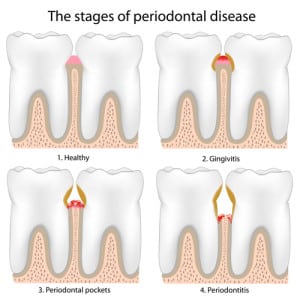 Periodontitis, or gum disease, is an infection caused by plaque or tartar (bacteria) that is left untreated on your teeth. It can damage your gum tissue, bone density, and even cause you to lose teeth in severe cases. How do you know you have gum disease? Periodontitis begins with gingivitis – which usually presents with inflamed, tender, or bleeding gum tissue. Most patients experience this bleeding and sensitivity when they’re brushing their teeth. Once the infection has progressed, you may notice a receding gum line or pockets forming around your teeth.
Periodontitis, or gum disease, is an infection caused by plaque or tartar (bacteria) that is left untreated on your teeth. It can damage your gum tissue, bone density, and even cause you to lose teeth in severe cases. How do you know you have gum disease? Periodontitis begins with gingivitis – which usually presents with inflamed, tender, or bleeding gum tissue. Most patients experience this bleeding and sensitivity when they’re brushing their teeth. Once the infection has progressed, you may notice a receding gum line or pockets forming around your teeth.
What Are The Symptoms Of Gum Disease?
As previously mentioned, a bleeding, tender, or receding gum line can be signs of an infection. However, these are not the only symptoms you may experience. Many patients don’t realize that things like chronic or persistent bad breath can be an indicator that there is too much bacteria in your mouth.
Other than these few signs, you may have loose teeth or they may have shifted which may make you feel as though your feet aren’t fitting together correctly anymore. You may also feel pain when you try to bite or chew food, as well as feeling sensitivity to extreme temperatures.
If you’ve noticed any of these symptoms lately (whether you’re brushing your teeth or not), it’s worth a phone call to your dentist. They’ll want to examine your mouth to see if an infection is present, but the earlier you’re able to catch the bacteria, the less likely it is to spread and the easier it is to treat.
